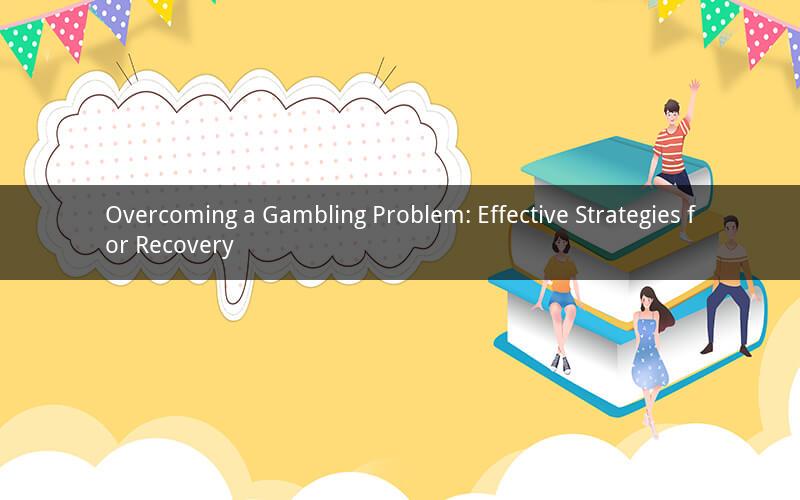
Introduction:
Gambling addiction, also known as compulsive gambling, is a serious issue that affects individuals, families, and communities. It is essential to address this problem promptly and effectively. In this article, we will explore various strategies to cope with a gambling problem, helping individuals on their path to recovery.
1. Understanding the Problem:
To tackle a gambling problem, it is crucial to first recognize the signs and symptoms of addiction. These may include financial difficulties, neglecting responsibilities, secretive behavior, and experiencing strong cravings for gambling. Acknowledging the problem is the first step towards overcoming it.
2. Seeking Support:
Reaching out for support is vital in the journey to recovery. Here are some effective ways to seek support:
a. Therapy: Consult with a mental health professional who specializes in gambling addiction. They can provide personalized therapy and guidance tailored to your specific needs.
b. Support Groups: Joining a support group, such as Gamblers Anonymous, can offer a sense of community and understanding. Sharing experiences with others who have faced similar challenges can be incredibly beneficial.
c. Family and Friends: Communicate with loved ones about your gambling problem and seek their support. They can offer emotional support, help you stay accountable, and remind you of your goals.
3. Developing Coping Mechanisms:
Overcoming a gambling problem requires developing healthy coping mechanisms. Here are some effective strategies:
a. Identify Triggers: Identify situations, emotions, or people that trigger your urge to gamble. Once identified, try to avoid these triggers or develop alternative coping strategies.
b. Engage in Healthy Activities: Find constructive activities that can fill the void left by gambling. This could include hobbies, exercise, or spending time with loved ones.
c. Practice Self-Reflection: Regular self-reflection can help you understand your thoughts and emotions. This can be done through journaling, meditation, or speaking with a therapist.
4. Financial Management:
Gambling addiction often leads to financial difficulties. It is crucial to address these issues to prevent relapse. Here are some steps to manage your finances:
a. Create a Budget: Develop a realistic budget that accounts for your essential expenses, debts, and savings. Stick to this budget to avoid overspending.
b. Seek Professional Help: If you are struggling with debt, consider seeking assistance from a financial advisor or credit counselor.
c. Set Financial Goals: Establish short-term and long-term financial goals to motivate yourself in the recovery process.
5. Relapse Prevention:
Relapse is a common challenge in overcoming a gambling problem. Here are some strategies to prevent relapse:
a. Stay Connected: Maintain regular contact with your support network, including therapists, support group members, and loved ones.
b. Monitor Your Progress: Regularly evaluate your progress and celebrate small victories. This can help keep you motivated and focused on your recovery goals.
c. Develop an Emergency Plan: In case of a relapse, have a plan in place to address the situation promptly. This may involve seeking immediate support or returning to therapy.
6. Legal and Ethical Considerations:
Gambling addiction can also have legal and ethical implications. It is important to be aware of the following:
a. Legal Consequences: In some cases, gambling addiction can lead to illegal activities, such as fraud or theft. It is crucial to address these issues promptly and seek legal counsel if necessary.
b. Ethical Considerations: Consider the impact of your gambling addiction on others, including family, friends, and colleagues. Strive to rebuild trust and make amends for any harm caused.
Conclusion:
Overcoming a gambling problem requires a comprehensive approach that includes understanding the problem, seeking support, developing coping mechanisms, managing finances, and preventing relapse. By taking these steps, individuals can embark on a journey towards recovery and lead a healthier, more fulfilling life.
Questions and Answers:
1. What are the signs and symptoms of gambling addiction?
Answer: Signs and symptoms of gambling addiction may include financial difficulties, neglecting responsibilities, secretive behavior, and experiencing strong cravings for gambling.
2. How can therapy help in overcoming a gambling problem?
Answer: Therapy can provide personalized guidance, help individuals understand the underlying causes of their addiction, and develop effective coping strategies.
3. What are some healthy activities that can replace gambling?
Answer: Healthy activities may include hobbies, exercise, spending time with loved ones, or engaging in creative pursuits.
4. How can I manage my finances during recovery?
Answer: Create a budget, seek professional help if needed, and set financial goals to manage your finances effectively.
5. What can I do to prevent relapse?
Answer: Stay connected with your support network, monitor your progress, and have an emergency plan in place to address relapse promptly.